One year on, here's what Rishi Sunak has done for women as Prime Minister
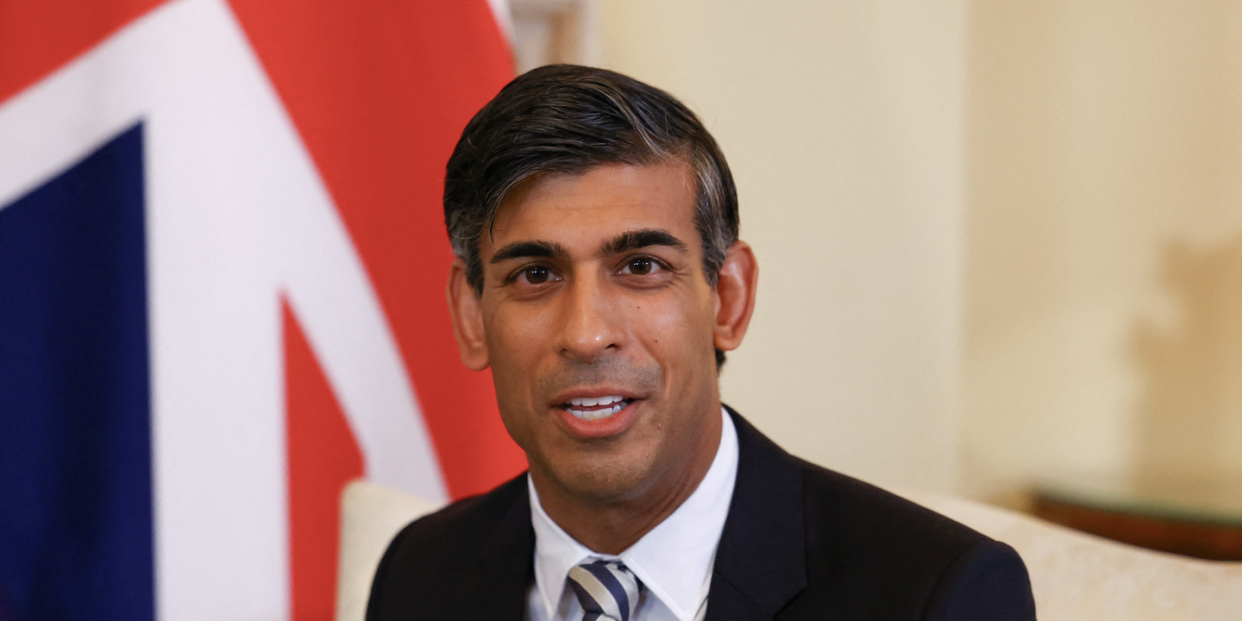
- Oops!Something went wrong.Please try again later.
After a tumultuous month with Liz Truss at the helm (which saw her outlived by a supermarket lettuce), Rishi Sunak secured enough Conservative Party support to become Prime Minister on 25 October 2022 – one whole year ago today. But when it comes to progress made over the last twelve months, where has Sunak fallen on the feminist topics most important to us all?
Having ran against Truss (and lost) in a leadership contest, Sunak entered the role with a list of pledges and promises he now had to put into action, having at last secured the top job. Alongside his financial plan to pull the UK’s economy out of the toilet, the former chancellor also had a so-called ‘manifesto for women’ which looked to tackle the numerous ongoing issues faced by 51% of the population.
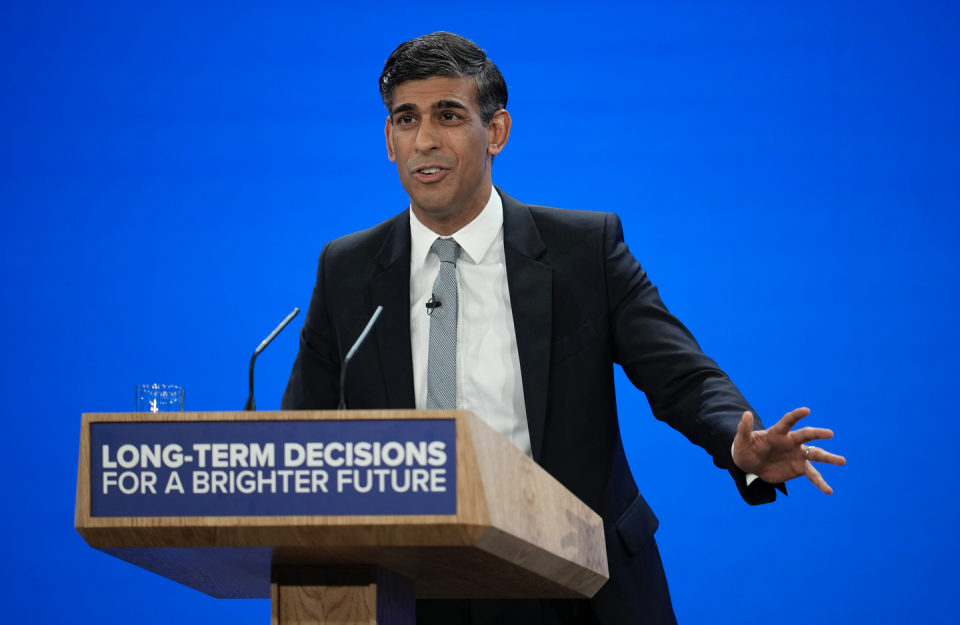
Yet, a year on, it’s safe to say Sunak has had a bruising time in number 10 – and many of our concerns are still yet to be fully addressed, or properly recognised at all. In fact, a poll by YouGov found that half of Britons believe Sunak has been a ‘poor or terrible’ PM, with ongoing economic turmoil, growing NHS waiting lists and the scrapping of HS2 among the many reasons leaving the Tory party trailing behind Labour in the popularity stakes.
Here, we take a deep dive to see what Sunak has – and hasn't – accomplished when it comes to his promises made to women…
The Cabinet
Sunak was criticised by women’s charities almost immediately after he took office, when it emerged that the Cabinet of Ministers he assembled was sorely short of female MPs. Fewer than a quarter of all people – about 23% – invited to attend cabinet meetings are women, yet this is a group supposedly meant to represent the entire country.
This figure is down from nearly a third at the start of Liz Truss’s premiership and is lower than under Boris Johnson, who had a 24% female majority, and Theresa May, at 30%.
This led to concerns as to whether or not women’s viewpoints and perspectives were to be fully considered in lawmaking.
Jessie Duncan, the Development Officer for Equal Representation for Engender, a charity that campaigns for men and women to have equal access to resources and power, said at the time: “It’s concerning to see representation taking a jump backwards at a time when the government is about to make huge budgetary decisions that are going to affect women’s lives across the UK.
“Women have so often borne the brunt of austerity measures and while having women in cabinet will not of itself solve these challenges, gender equality at all levels of decision-making is fundamental. Without [that], the government cannot hope to act in the best interests of all its citizens.”
Childcare
When campaigning to become PM in 2022, Sunak said he “recognised women are still shouldering a disproportionate burden of family life” and promised to look again at “childcare and make sure public services are family friendly”.
The numbers back up those concerns too: children’s charity Theirworld found one in four UK parents have to give up their job, or drop out of education, to look after their children, and ONS research shows that 32,000 women left the workforce in 2022 to look after their kids.
Ready for some good news? Since last year, efforts have been made to pour more public investment into early years childcare, which would enable more women to return to the workforce should they so choose. The Spring budget saw Sunak’s chancellor, Jeremy Hunt, extend the 30 hours of free childcare to all children aged between nine months and five years – a move that came after years of tireless campaigning from the likes of Pregnant Then Screwed.
However, the reforms, which are not expected to be implemented until 2025, also have their drawbacks.
Nursery providers say the amount the government pays them for free childcare hours – known as funded places – does not cover the costs of providing those additional hours, with the Women's Budget Group estimating the shortfall to be around £1.82 billion.
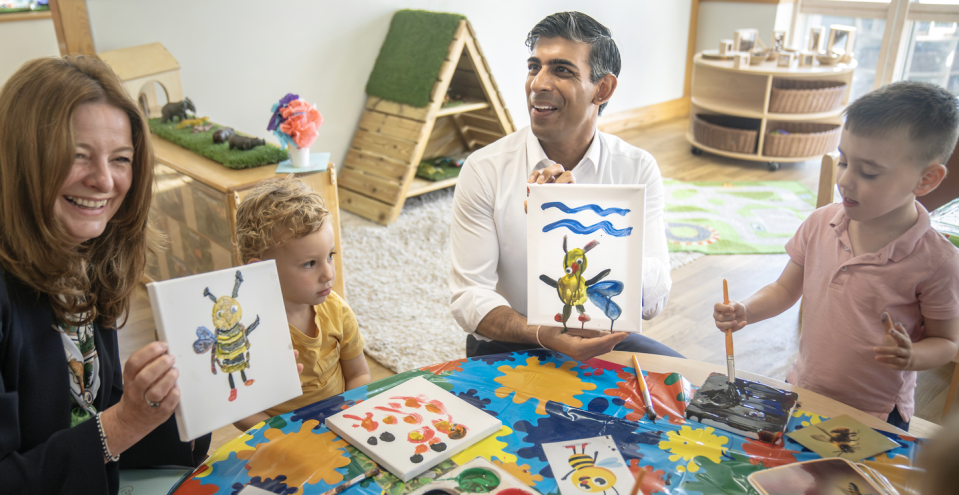
The nursery sector is also struggling to recruit and retain staff. Hourly rates are well below the average of other occupations – and with 98.2% of staff members being women, industry experts are calling for better pay in order to support the plans.
The Fawcett Society’s chief executive, Jemima Olchawski, told Cosmopolitan UK: "It's fair to say Sunak hasn’t been a Prime Minister for women. Our research shows that childcare is a key issue for women voters and perhaps the biggest achievement for women from this government has been the commitment to childcare reform. Unfortunately, this wasn’t really the solution it was heralded as in the spring budget – without proper and holistic reform we risk yet another sticking plaster on a failing system which doesn’t work for those on lower pay and women working in the sector.
"It's also been disappointing that Sunak rowed back on previous Conservative commitments to improve the lives of women at work: protection from sexual harassment, a right to request flexible working arrangements from day one and extended redundancy protections for new mums. These issues were deprioritised by Sunak and his Cabinet and left to be picked up as Private Members Bills, which are notoriously difficult to get through Parliament, or just ignored.
"We’re so pleased to see the issues women care about making it onto the agenda, but now we need to see Sunak follow through. Our polling tells us he’ll need to – in order to get women’s votes."
Immigration and asylum
One of Sunak’s key pledges was to ‘stop the boats’, with the PM overseeing a significant reduction in crossings via the English Channel – numbers are down by about a third in the past year.
The government are currently waiting to see if their hugely controversial plan to ship asylum seekers to Rwanda will be approved by the Supreme Court. Should the court find it does violate the UK’s commitment to human rights, then we may see efforts made for the UK to withdraw from the European Convention of Human Rights (which, yep, is as concerning as it sounds). This would also see us leave behind the legally binding standards specifically put in place to prevent gender-based violence, protect victims of violence and punish perpetrators.
Many charities, including Women for Refugee Women, have criticised Sunak’s government and their heavy-handed attitude to some of the most vulnerable people in society. "As we mark one year of Rishi Sunak’s leadership as Prime Minister, we feel disappointed, angry and sad at the repeated attacks on women seeking safety we have seen under his leadership.
"Women seeking protection in the UK from war, conflict, violence and other torture are being repeatedly failed by the hostility of the UK’s asylum system,” a spokesperson told Cosmopolitan UK.
"Under Sunak’s leadership, we have seen an incredibly harmful piece of legislation, the Illegal Migration Act, become law; asylum-seeking women have been left languishing in the system and substandard accommodation for months, even years; and women seeking safety have been vilified to distract and blame for the Government's own failings."
Violence against women and girls
In his leadership bid, Sunak claimed he'd make ‘downblousing’ – the act of taking a photograph down a woman’s top without her consent – illegal. No legislation has been put in place as of yet.
Sunak also announced plans for a ‘grooming gang task force’, designed to put a halt to child exploitation, with the Prime Minister announcing plans in April to recruit specialist officers (supported by the National Crime Agency).
Elsewhere, the government has introduced some legislation to tackle the ongoing issue of violence against women and girls.
“No woman or girl should ever have to feel unsafe in her home or community and I am determined to stamp out these appalling crimes,” Sunak said in April this year, after announcing reforms. “As well as extra support for victims, we’re making it a priority for the police to tackle violence against women and girls, and toughening up the way offenders are managed – preventing more of these crimes from happening in the first place, and bringing more perpetrators to justice.”
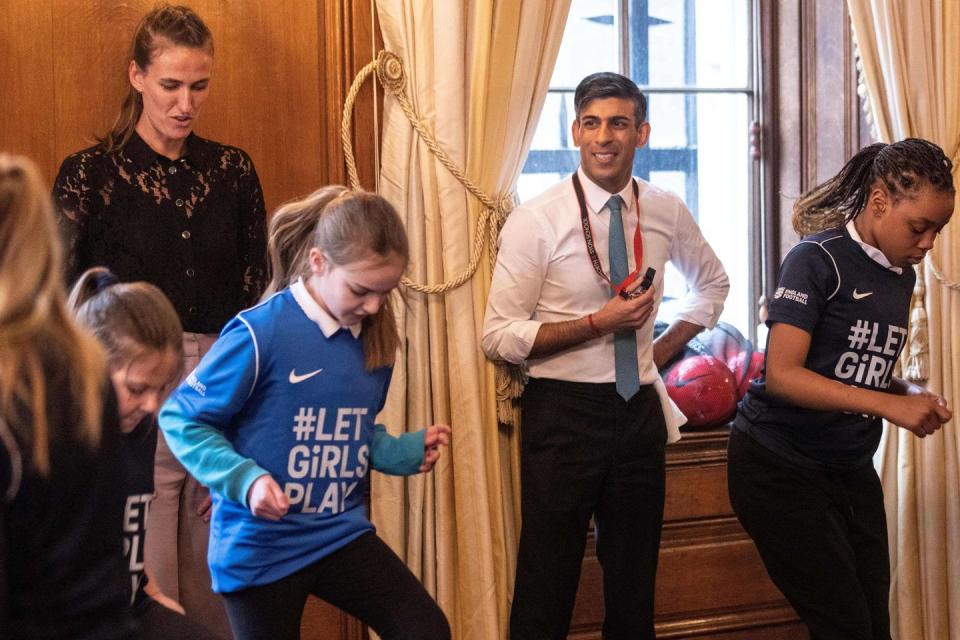
In response to this, Sophie Francis-Cansfield, head of external affairs at Women’s Aid, told Cosmopolitan UK, “We have seen promises of improvements and glimpses of hope. In February of this year, the Government announced that coercive control will be seen as on par with physical violence, meaning that offenders can receive harsher punishments and will be monitored more actively by police.
“It has also been announced that abusers will be fitted with tags, preventing them from going near the survivors’ homes, while also being made to attend behaviour change programmes. Similarly, the introduction of Jade’s Law, which will ensure that prisoners who murdered their partner will no longer have parental rights over their children, was very welcome.”
However, many feel far more needs to be done to fully ensure the safety of women, something Sunak has claimed is a cause close to his heart, given he is a “father of daughters.”
“The Prime Minister has made promises over the last year to tackle Violence Against Women and Girls (VAWG) and labelled it a national threat with a requirement on police to tackle this as a strategic priority,” Ellen Miller, interim CEO at Refuge, told Cosmopolitan UK. “A willingness to acknowledge the seriousness of these crimes is promising, however very little has been done to restore women's faith in the police and judicial system [which has be outed as having perpetrators of sexual violence within its ranks].
“If women are to have the confidence to report abuse, they need to know that police forces take allegations of VAWG seriously – and [that they will] immediately suspend any police officer or staff member accused of such crimes. Without adequate funding, and duties that compel public sector organisations to act, then meaningful change will not happen and the Prime Minister’s promises will simply be empty words.”
It’s a sentiment that Francis-Cansfield agrees with, adding, “Conviction rates for crimes against women and girls still remain woefully low. If we want to see a real, tangible impact, we need to take a whole-system approach to domestic abuse. What is a national threat, must truly be seen and addressed as a national priority.”
Online Safety Bill
The controversial and much-revised bill is set to become law under Sunak’s government; the legislation looks to protect users from harmful material online, and will force social media firms to remove illegal content or face a fine.
New offences have also been included in the bill, such as cyberflashing and the sharing of "deepfake" pornography (a form of intimate image abuse that sees falsified sexual images or videos created at the expense of the victim, typically without their knowledge or permission).
However, Deniz Uğur, Deputy Director of the End Violence Against Women Coalition, has expressed concern on how effective this law could really be when it is put into effect.
“Much will depend on how new guidance is developed to hold tech companies accountable for preventing the abuse that they currently profit from,” she told Cosmopolitan UK. “Its success will also depend on the prioritisation and investment in prevention work in schools, including quality relationships and sex education, and wider prevention work across society.
“This ought to include public information campaigns to shift the attitudes see violence against women and girls normalised (and tolerated), and inform the public on how to safely intervene as bystanders.”
Healthcare
Sunak has abstained on all votes about abortion bar one since he became an MP in 2015, and when a British woman, Carla Foster, 45, was jailed for illegally taking abortion tablets when she was between 32 and 34 weeks pregnant during lockdown, a spokesperson for the Prime Minister declined to engage in debate on reforming government policy.
“Through the Abortion Act, all women have access to safe abortions on the NHS up to 24 weeks and we have made changes so that now includes taking abortion pills at home,” the representative said at the time. “We think this approach provides the right balance and… there are no plans to change this.”
Sunak has been more vocal when it comes to trans healthcare though, expressing inflammatory (and potentially harmful) views about trans people.
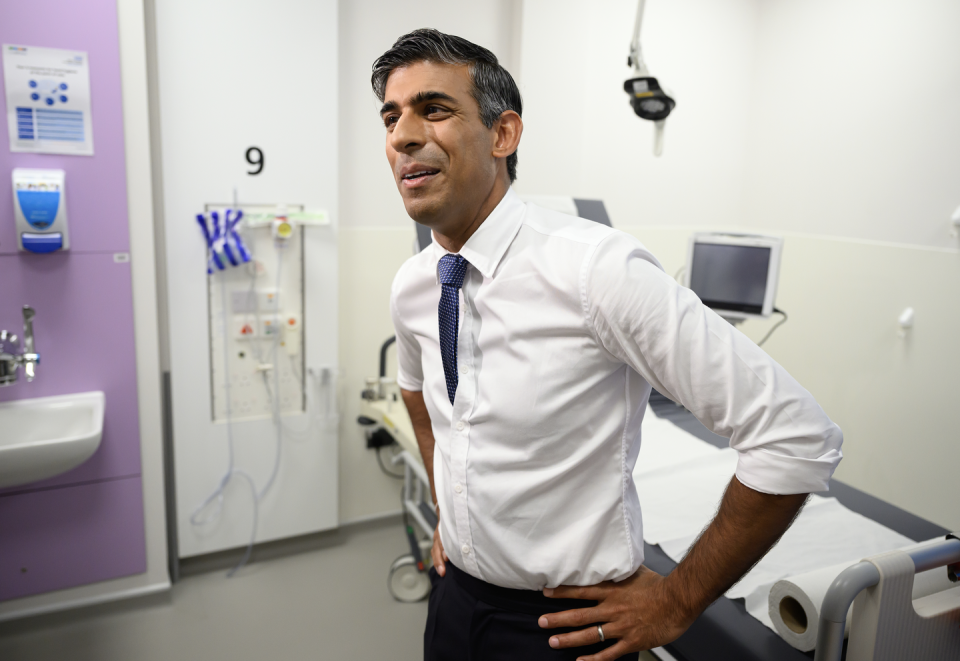
Speaking at the Conservative Party Conference in Manchester, this October, the PM said, “We shouldn’t get bullied into believing that people can be any sex they want to be. They can’t – a man is a man and a woman is a woman. That’s just common sense.
“It shouldn’t be controversial for parents to know what their children are being taught in school about relationships. Patients should know when hospitals are talking about men or women.”
His comments echoed those of health secretary Steve Barclay, who announced a consultation that could see transgender people banned from single-sex hospital wards, in the NHS. The health secretary also announced that sex-specific language has been restored to online NHS advice pages, e.g those about cervical and ovarian cancer, and menopause.
However, it is vital to note that if trans people are refused access to certain medical spaces, the decision could have dire consequences – and that an FOI request which asked 102 different NHS trusts 'how many natal female inpatients have complained that a transgender woman inpatient was being cared for in the same ward?' found the answer was 'zero'.
“Trans people already are less likely to seek medical care because they are concerned they will be judged,” Cleo Madeleine, a spokesperson for Gendered Intelligence said, calling the news ‘disappointing.’ “Announcements like this just reinforce those fears.” Already, one in seven LGBT people, including more than a third of trans people, have avoided treatment for fear of prejudice.
You can read Cosmopolitan UK’s response to Sunak’s comments about trans people here.
LGBTQ+ community
While Sunak has been criticised for his inflammatory comments about trans people, he is reportedly pushing ahead to ban conversion therapy for LGBTQ+ community.
It is yet to be officially announced, but is expected to be confirmed in the King’s Speech later this year. Under the legislation, it would become a criminal offence to attempt to change someone’s sexuality and gender identity in England and Wales.
[editoriallinks id='50885478-ff7d-484d-b9c3-c95fbc8b23b7' align='center'][/editoriallinks
You Might Also Like

